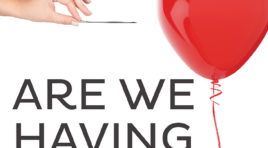What do you think? Is work fun?
It’s really the question that keeps getting asked when we talk about the future of work, and employee experience, and employee engagement, etc. Do you believe that your work is “fun”?
Fun?
That’s the first problem, we really have to define what fun is. I mean if we are doing this all official HR-like, right!?! Let’s over-process and over-think this! What is fun? Is a scale for all of us. Is doing an employee file audit fun? Maybe not for you, but you know some of us like to get freaky, so no judgement on what you call fun!
Tyler Cowen has a new book coming out titled “Big Business” and in one section he asks this question: Is work fun? Here’s part of that section from the book:
To oversimplify by only a bit, they have to pay you to do it. And that suggests work is not in every way fun. Furthermore, for most people work is the main way that they interact with business on a daily basis, which means that business is associated with the activities that take some of the fun out of our lives. Bits of fun are drained on a very regular basis, often five days a week, but the paychecks arrive less frequently in most cases and often by the less visible means of direct deposit. So the stresses and tedium of the work are for many people more vivid than the wages they earn. And that in sum is one reason business is not entirely popular with the American public—or, indeed, with the public elsewhere in the world. Business is like the parent who tells you that you can’t have everything you want all the time.
Some recent studies and surveys illustrate the potential burden of work. Nobel laureate Daniel Kahneman and economist Alan Krueger measure our “daily affective experiences” by having people wear beepers that go off at irregular intervals, at which time the people record what they are doing and their feelings. You can think of this as a technique for measuring moods. But the researchers ask about more than just the subjects’ feelings at a given point in time; they also ask how happy people are with various aspects of their lives. The study thus considers both momentary pleasure and the overall feeling of satisfaction from a life well spent, because happiness isn’t just a single thing with a unidimensional scale. For this study, the researchers recruited 909 employed women with an average age of thirty-eight and an average household income of $54,700.
And what did the researchers find? The highest-rated activities, from most favored to less favored, were intimate relations, socializing, relaxing, and prayer/worship/meditation. In the middle of the list were watching TV, preparing food, and talking on the phone, among other mundane activities. The bottom five were childcare, computer/email/ internet, housework, working, and—dead last—commuting.
So working is next to last in terms of producing a positive mood, and that is sad news. But that doesn’t mean we don’t like work; it only means we like other things better. And in fact, when you drill down, the ratio of people who have positive feelings about work to those who have negative feelings is just over 3.5 to 1. (That’s not as good as the 5.10 to 0.36 positive-to-negative ratio for intimate relations, but sex always was going to beat out work anyway.)
I love the concept of because we get ‘paid’ to work, that in of itself tells you that work isn’t fun, because in almost all cases people don’t get paid to do things that are ‘fun’. No one is getting paid to take vacations to Disney World. No one is getting paid to sit on the beach and sip frozen cocktails with zero responsibilities.
Now, I know a lot of people who get paid to do some fun stuff as part of their job, but that’s a small portion of their job, not their complete job.
I think for most of us, there are some aspects of our jobs that are fun. It’s a balance between some truly fun stuff and some stuff we are just getting paid to do, which if given a choice we would not choose to do if we weren’t being paid.
Does this then lead us down a path as leaders and HR pros to how do we add little bits of fun into work?
I think it’s something to test in our workplaces. Not forced fun. That’s the opposite of fun. But true, in the moments bits of fun. That’s the hard part, right? How do we free our leaders, or teach them, to have fun with their teams in the moment? If we figure that out, that probably unlocks a ton of positive outcomes for our employees and our organizations!

tim sackett